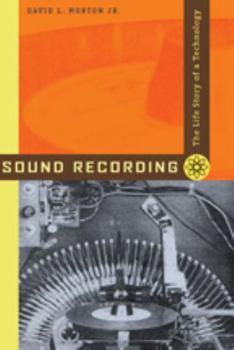Sound Recording: The Life Story of a Technology
Select Format
Select Condition 
Book Overview
How did one of the great inventions of the nineteenth century--Thomas Edison's phonograph--eventually lead to one of the most culturally and economically significant technologies of the twentieth and twenty-first centuries? Sound Recording traces the history of the business boom and the cultural revolution that Edison's invention made possible.
Recorded sound has pervaded nearly every facet of modern life--not just popular music, but also mundane office dictation machines, radio and television programs, and even telephone answering machines. Just as styles of music have evolved, so too have the formats through which sound has been captured--from 78s to LPs, LPs to cassette tapes, tapes to CDs, and on to electronic formats. The quest for better sound has certainly driven technological change, but according to David L. Morton, so have business strategies, patent battles, and a host of other factors.





